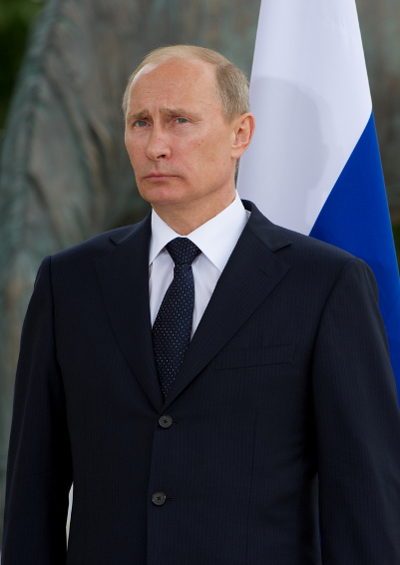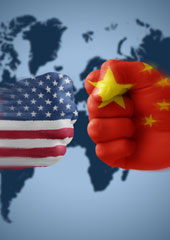Putin’s Failure as a Grand Strategist
Vladimir Putin’s obsession with power could cause Russia to slip down the dragon’s throat.
July 9, 2014

Vladimir Putin has tied the West in knots over the annexation of Crimea and the destabilization of Ukraine. Those actions have won him great popularity in Russia for standing up to the West as the champion of Russian national greatness. Nevertheless, Putin is failing as a grand strategist.
After all, Russia’s most serious geopolitical challenges do not lie to the West. The United States and Europe will never accept the annexation of Crimea de jure, but have already signaled their acceptance de facto.
The signature of an association agreement between Ukraine and the European Union may infuriate Putin. It may also undermine his pet project of creating a Eurasian Economic Union. It does not, however, threaten core Russian national interests.
Moreover, despite initial sanctions and a chilling of relations, both are anxious to maintain cooperation with Russia on issues such as arms control, Iran sanctions, space, the environment and governance of the Arctic. They would also like to restore more normal trade and investment relations if and when circumstances permit.
Russia’s real threats
Most critically, neither the United States nor Europe has any interest in acquiring, occupying or exploiting sovereign territory of the Russian Federation. The same cannot be said about Russia’s South and East, where Putin’s real strategic challenges lie.
To the South, Moscow must deal with a rapidly growing Muslim population. Aspirations for greater autonomy and even independence have been crushed by brutal repression and rule by Russian puppets. The savagery with which Putin laid waste to Grozny and subdued the rest of Chechnya will not soon be forgotten.
The psychological impact of this treatment in Muslim territories has been compounded by the overt racism — the dark underside of Russian nationalism.
The civil disorder and terrorism that have resulted from Russia’s actions do not yet pose a threat to Russian control of its Muslim population. However, they are bound to grow worse over time, consuming scarce resources and diverting the Kremlin’s attention from other pressing problems.
The Siberian power vacuum
The most serious challenge for Putin and Russia lies to the East. Eastern Siberia and the Russian Far East contain a cornucopia of timber, oil, gas, minerals and other valuable resources. Russia has neither the people nor the capital to develop these resources on its own.
Climate change is making these resources more accessible by opening up northern sea lanes and shortening the harsh winter season. The Russian population in this vast region is not just small, but also declining.
Moscow’s strategy to control the region has relied on using centrally appointed governors — locally elected ones have shown dangerous separatist tendencies — and widely dispersed security forces.
When one compares these efforts and personnel resources to those of neighboring regions and countries, it is clear that there is a power vacuum. That vacuum will eventually be filled.
The People’s Republic of Eastern Siberia
The natural candidate to fill it is China. There is already a growing Chinese population engaged in trade and agriculture on the Russian side of the Amur River.
As Chinese penetration of the region increases, local Chinese will increasingly look to Beijing for “protection.” Clumsy Russian attempts to assert control will be met with ultimatums from China.
Throw in a few incidents, a few power-hungry local leaders under the sway of Chinese money, as well as tactical intervention by the Red Army to protect Chinese citizens — and you realize one thing quickly: The “People’s Republic of Eastern Siberia” is a step away from being born.
Moscow would attempt to retain control. It would not succeed in the face of Chinese military power and financial resources.
The details of how Chinese control over Eastern Russia might be achieved is less important than the recognition that the dynamic balance of forces in the region will organically lead to this result.
Russia could prevent it with the introduction of a sufficient counterforce. Putin has shown no sign that he recognizes what is happening, not to speak of identifying a sufficient counterforce.
Asian allies
The gain to China would be great and the loss to Russia equally great. China’s government would gain privileged access to valuable resources. China’s people would gain virgin territory into which tens of millions of Chinese confronted with polluted air, soil and water could move.
China would greatly enhance its position as the dominant power in East Asia and gain leverage in its geo-strategic competition with the United States and its allies. Russia would be instantly reduced to a second-rank power, with greatly reduced national prospects and international influence.
Putin does have a geostrategic alternative. Russia could enter into a broad framework agreement with Japan. Such a deal would provide the financial resources, technology and expertise necessary for the economic development of Eastern Siberia and the Russian Far East.
A critical element of this agreement would be ironclad guarantees to respect Russia’s sovereignty. The economic and geostrategic benefits of such an agreement to Japan would be great.
Russia could probably get Japan to pay for, or at least finance, critical infrastructure, provision of public services and even national security enhancements that Russia otherwise could not afford.
Checking China
The agreement would have to be implemented in stages over decades. Still, a fast start would probably be enough to check any designs by China, particularly with the international support discussed below.
Such an agreement would not only serve Russia’s core interests by protecting its sovereignty and strengthening its economy. It would also serve Japan’s core interests by giving its economy and society a badly needed boost in growth and confidence.
At least equally critical is that such a Russia-Japan deal would check China’s geopolitical ambitions. That, in turn, would take pressure off the South China Sea, to the benefit of the United States and its allies, particularly Australia.
Sliding down the dragon’s throat
Given its adversarial relationship with Japan and historical ties with China, South Korea’s role in this new arrangement would have to be handled with delicacy and finesse. The United States should be willing to use its influence in the region to provide the necessary international support for the agreement while avoiding an open conflict with China.
Unfortunately, Vladimir Putin is so obsessed with Russia gaining power and respect as an alternative civilization to the West that he is missing the big picture. Instead, he will be drawn further into a rejectionist alliance with Syria, Iran and China. He has already signed a natural gas export deal with China on terms favorable to China.
If he continues down this path, Russia will not only slide bit by bit down the dragon’s throat, but will have missed one of the great geopolitical opportunities of the last one hundred years.
Takeaways
Russia’s most serious geopolitical challenges do not lie to the West but to Russia’s South and East.
Eastern Siberia and the Russian Far East contain a power vacuum. The natural candidate to fill it is China.
Local Chinese look to Beijing for “protection.” The “People’s Republic of Eastern Siberia” is nearly being born.
A Russia-Japan deal would check China’s geopolitical ambitions.
Vladimir Putin is so obsessed with Russia as an alternative civilization to the west that he misses the big picture.
Read previous

China and America: We Are Not Enemies
July 9, 2014
